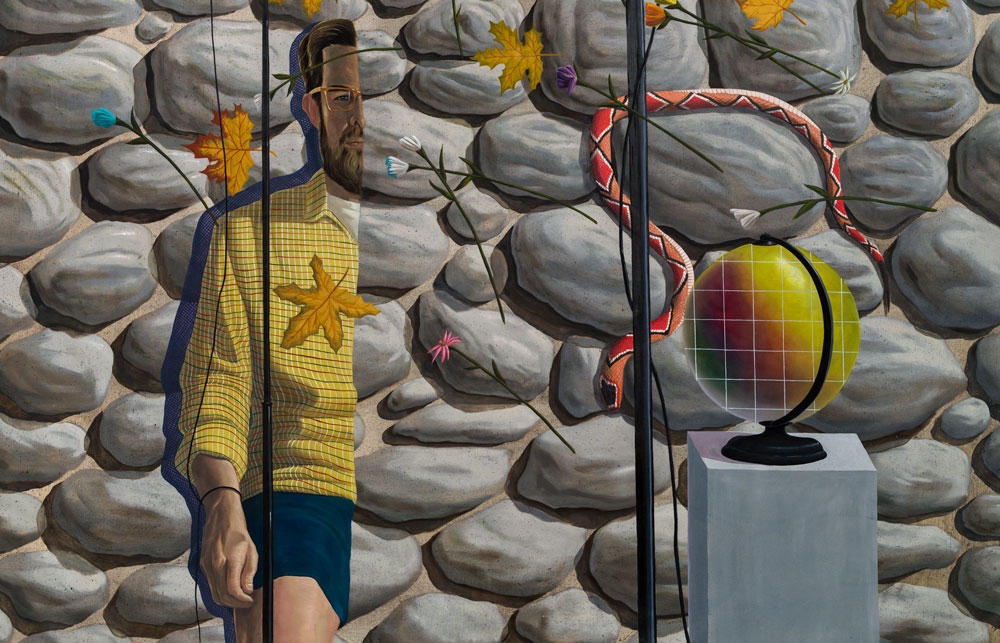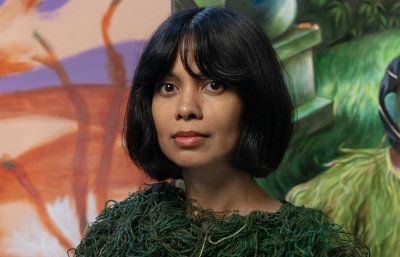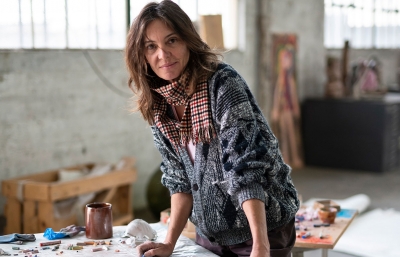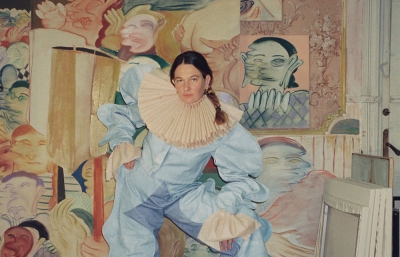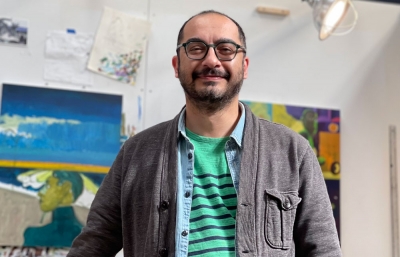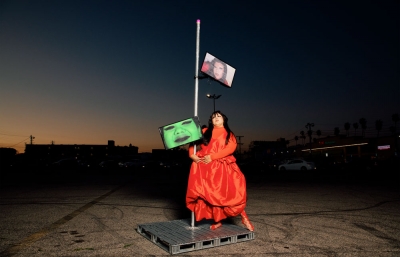Kevin Christy
A Step Up the Ghost Ladder
Interview and portrait by Ed Templeton
Kevin Christy is one of my very few art-buddies, and now that I think about it, probably my only one. I live in a self-imposed art-vacuum in Orange County, and he lives in Los Angeles, so when I drive up to see an exhibition, I usually invite him to join me so we can enjoy a conversation about art and painting with someone other than my wife Deanna. It’s a treat for me because Kevin has clear opinions and great hot takes about everything going on in the art world. It’s nice to be able to nerd-out with a fellow painter and talk about techniques and things we have learned.
Most likely, you’ve seen Kevin’s face before. It has a tendency to pop up in random TV shows and commercials, emerging briefly with a funny line in a movie. Or maybe you’re a stand-up comedy fan and saw him on stage at the Comedy Store or opening for Whitney Cummings or Marc Maron. I bet you never dreamed that the person you subconsciously recognize is also a gifted painter who shows his work in galleries worldwide and will be having a solo exhibition of his newest work at the Hole Gallery in NYC opening on March 16, 2024. We recently got together to discuss the new work and how his two worlds combine to make him the wonderful person he is.

Ed Templeton: I don’t think you’ve been in Juxtapoz before, so let's assume that there's a whole new audience being introduced to your work and who you are for the first time. I want to paint the picture of who Kevin Christy is. Because when we first met, it was you as a publisher doing the Broken Wrist Project books that featured artist profiles and illustrated short stories, which blurred the lines between art books and literary journals.
Kevin Christy: That is true, yeah.
Then, I found out you were an artist because I saw an exhibition in Los Angeles. So how do we get to stand-up comedy from there? I think that’s something people will find interesting.
I don't promote any of it, so it’s a thing for a lot of people; if you know me long enough, you just find out organically.
I mean, when I describe you to people, I say, “My friend Kevin, he's a great painter, but also a regular at The Comedy Store." And you can see their brain trip out a little bit, like, "Whoa, really?"
It doesn't feel weird to me at all or uncommon, but I guess it is a little uncommon.
In today's day and age, yeah, everyone does many different things. But I’m not sure I know any legit artists who are also legit stand-up comedians. It's not like you have just waltzed into these roles. They don't just give people regular spots at the Comedy Store for nothing.
They don't—I'm lucky in that I don't come across as someone who's “dabbling.” I've been doing these things long enough that within each little group, the people respect me.

Yeah. I feel that similarity with skateboarding and art, too.
I think that's why you and I relate to each other, because people are routinely finding out you're an artist, but you’ve also been doing this for a long time.
As a stand-up comedian who is friends with all these people who live and breathe comedy, I imagine you talk about that a lot. But how does that fold into your artwork? I don't think comedy is absent from your work. I think that you paint things that make you laugh or amuse you in some way.
I don't know that it's a part of my brain that I could even cut out. I think, based on my natural sensibility and my natural taste, that life is pretty absurd. So, I think that I have an underlying skepticism. I think that's just the way I think about everything. That's all this series of paintings is about—the fact that we're living in a dying system. It's pretty obvious that things are crumbling.
Do you have any idea what caused this rapid decline?
The dissemination of information and the monetization of it are happening so fast that people don't have enough day-to-day time to figure out what's real and what's not. Every form of information is harmful if you want to use it that way. The truth is harmful. Lies are harmful. There are no parameters anymore. Everyone I know is freaked out. It's not even specific to an age group.

“ I think, based on my natural sensibility and my natural taste, that life is pretty absurd.”
It's funny, though, in watching a lot of old movies from the 1930’s, the language in them is eerily familiar to today. People talk the same way now as they did then because they were dealing with the Depression. Life was moving too fast for them, too.
Every generation is freaked out by the one behind them or two generations behind them. I think a big difference now is that all the generations talk to each other on the internet. You couldn’t do that before. Everyone is talking at each other, so it's become this very confusing dialogue where people in their 50s are really mad that someone who's 23 doesn't think they're cool when there's no reason they should. It's just an opinion mosh-pit.
I kind of think the only rational thing to do is make art in this space, because what the hell else are you going to do? Gerhard Richter said in an interview, "Being an artist is being a coward.” I completely agree with that. He’s saying, "That world over there, I have no ability to deal with that shit." I can stand over here and make jokes about it or make paintings about how it makes me feel, but I can't go engage with it.

Yeah, I guess I feel that with photography to some extent. I want to look and shoot photos, but oftentimes, I don't want to get involved.
But you want to see it. I'm obsessed with how people get by. I want to know how everyone is figuring it out because everyone I know has no idea what they're doing almost all of the time.
I feel like the whole idea of imposter syndrome doesn't matter to me anymore. I've been so lucky to be able to travel and talk to so many people through skateboarding and art that I realized, like you said, everybody’s in the same boat. Nobody thinks they're worthy, and everyone is winging it as they go.
If you don't mildly hate yourself, I don't know how to relate to you. I will say the difference between art and entertainment is that when you're making art, especially paintings, the shadow of the history of painting is huge.
I don't know if you feel this, but every time I sit down to make something, I'm like, "I'm over here competing with Otto Dix, Kerry James Marshall, Ashley Macomber, and these insanely talented people. I can only think, "I am just going to do my best."
I look at Instagram, and I just see incredible paintings that floor me. I think, "What am I even doing here? Why am I doing this?" It spurs me to want to get in the studio. Whenever I see great art, I instantly feel like I'm blowing it by not being in the studio.
The bar is high, and if you're not working legitimately hard, you don't stand a chance. I think the vast majority of artists who do well in art, they're working their asses off.

So how many preparatory sketches do you do before you start painting?
The truth is, lately, I don't do a ton of drawings. I usually text myself an idea so I don't forget it. I think about it for a while. I almost compose it in my head, and then lately, mostly because of time constraints, I just draw it right on the canvas.
Half of these paintings have a painting underneath that was a failure. So, if I drew a little more often, I wouldn't have that happen, but I also don't love the kind of assembly line style. I like a certain amount of discovery.
That's super interesting to me. I feel I'm way more of a full prep sketch person now, using my own photo archive and memories of things I’ve seen in order to cobble together my composition.
I do take more photos as source material now. Lately, I've been hiring models and using them. I use my friends.
You're not giving them the Otto Dix treatment, where they look terrible.
No, no. I make sure they look good. I tell them, "You’ll look cool." My friend Grace, I told her, "You're going to be in a band. You're going to look cool." I understand vanity. I'm an incredibly vain person.
That's really intriguing. I would like to be looser with my painting. The fact that I have this super mapped-out plan makes me feel like I'm fulfilling something that I did months or even years ago. I don't have that discovery you talk about. I am trying to work towards that.
Because my art is surreal, technically, I think it's probably a bit easier for me to add stuff. It is free in the sense that I can react to my own ideas.
It's interesting that you used the word surrealism because I think there might've been a few times when I tried to explain your work to people that I was talking to. And I wanted to say “surrealist,” but then I was like, "Gosh, I wonder if Kevin would be bummed if I said that?" Would I call this a surrealist work?
Luckily, in the last decade, surrealism has had less of a stigma. There's been so much more of it that you don't only think of the corny aspects of it. People just call it conceptualist painting, which is honestly what it is.

I think I cringed at the word because Dalí seems like a high school student's favorite artist. It's one of those things where you think, "Sure, I like Dalí still," but I don't know if I'm claiming that in public.” But when I'm in a museum, I still enjoy looking at his paintings.
It's like how in high school you love M.C. Escher, and then you pretend you don't for 20 years and then, later, you're like, "This guy was pretty fucking amazing."
I saw an M.C. Escher retrospective exhibition at the Kunstmuseum Den Haag last year. I was sending you photos from it. Deanna and I were both just like, "Holy fuck." The work is so precise and incredible.
His pattern stuff is so wild. I'm really attracted to that Bauhaus model. There's an artist from the Bauhaus; her name is Gunta Stölzl. She could do patterns and make textiles. She did graphic design. I love the way a lot of people from that era did multiple things. They were architects, designers, and painters. I often wonder why that isn't more common.
We're living in the world of multi-hyphenates now. You and I are great examples of that. It's not easy to describe what you do. You’re a painter, bookmaker, illustrator, actor, and standup comedian. So what came first—you doing art school and then getting a commercial job?
I got my first commercial in art school by chance at an art opening for the Clayton Brothers, where they happened to be filming a commercial for a beer company. You had to sign a waiver to go in and see the art. They ended up putting me in the commercial because I looked like an art school kid. I had the glasses and everything, and they gave me $6,000, which was a million dollars to me.
Do you have a name for your show at The Hole yet?
Ghost Ladder.
Like stepping onto a ladder that isn’t there and falling flat on your face.
Yeah. It's all the things, all the normal systems are gone.
Kevin Christy will open a solo show with The Hole in Tribeca on March 16, 2024. This interview was originally published in our SPRING 2024 Quarterly.

